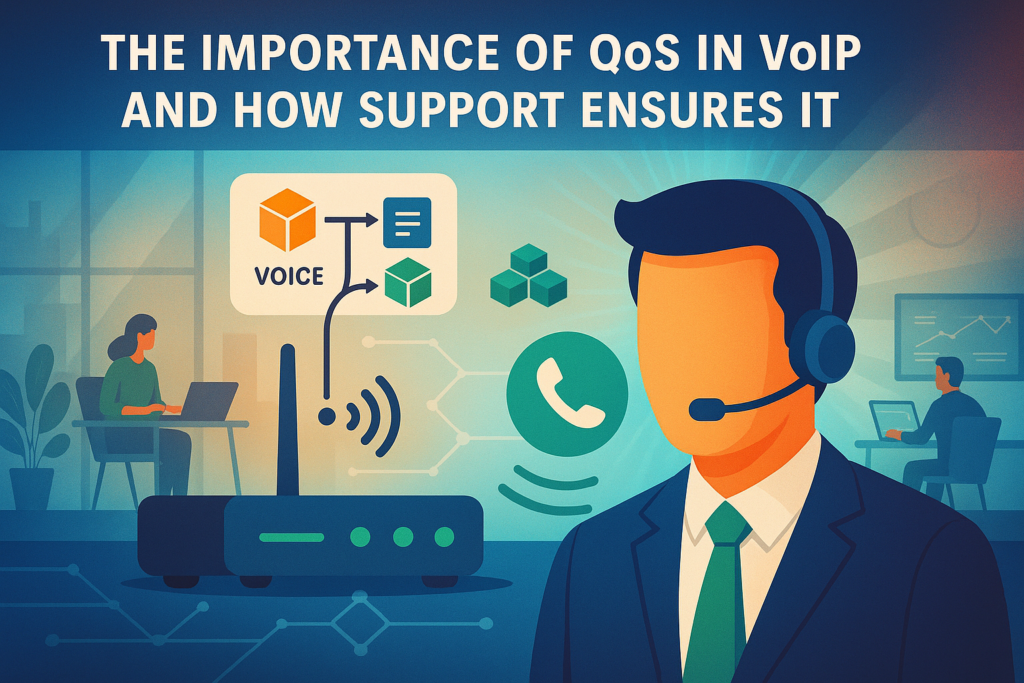The Importance of QoS in VoIP and How Support Ensures It

VoIP transmits voice data over IP networks, which are inherently unreliable without mechanisms to manage congestion, prioritize traffic, and handle latency.
QoS ensures that voice packets are delivered:
- On time
- In order
- Without loss or delay
This is especially crucial for voip for remote workers, who depend on stable, high-quality connections from diverse locations and varying internet conditions.
Why QoS Matters for VoIP Systems
VoIP doesn’t have the luxury of buffering like video streaming. Real-time communication demands precision. Poor QoS can lead to:
- Choppy audio
- Dropped calls
- Echo and delay
- Garbled voice quality
These issues hurt productivity and customer experience. Businesses relying on top enterprise VoIP providers must ensure QoS is implemented and regularly optimized to meet growing communication needs.
How QoS Operates in VoIP Environments
QoS in VoIP environments functions through three main components:
1. Prioritization of Voice Traffic
Voice packets are tagged as high priority so routers and switches treat them differently from general data like emails or file transfers.
2. Bandwidth Reservation
A segment of bandwidth is reserved exclusively for voice traffic, preventing disruption from other activities like video streaming or large downloads.
3. Traffic Shaping and Queue Management
QoS manages the flow of data through buffers and queues to avoid congestion and reduce latency.
These measures are especially valuable for companies offering VoIP support services, who use them to maintain service quality across diverse network infrastructures.
Role of Support in Enforcing QoS
Setting up QoS is only the beginning. Maintaining high-quality VoIP requires ongoing monitoring and technical intervention. This is where VoIP support services play a crucial role.
Ongoing Monitoring
Real-time analytics detect call quality issues like jitter, packet loss, or delay. A skilled support team can quickly resolve them before they affect users.
Performance Tuning
Support teams tweak QoS settings in response to traffic fluctuations, seasonal usage changes, or new application rollouts.
Remote User Optimization
For organizations with distributed teams, VoIP support ensures voip for remote workers is equally reliable, regardless of location or ISP quality.
Why QoS Is a Business Priority
As the workplace becomes more distributed, clear communication is vital. If customers can’t hear you—or worse, if the call drops mid-conversation—it reflects poorly on your brand. With many businesses now ranking communication quality as a top priority, QoS is no longer optional.
Key Benefits of Effective QoS in VoIP
- Enhanced customer experience
- Fewer dropped or distorted calls
- Increased productivity for remote teams
- Better support for unified communications platforms
Evaluating Providers: QoS & Support as Differentiators
When exploring the top 10 VoIP companies, businesses should look beyond features and pricing. What really matters is how well these providers handle QoS and technical support.
What to Look For in Top Enterprise VoIP Providers
- Dedicated bandwidth and QoS configuration
- 24/7 customer and technical support
- Experience managing voip for remote workers
- Real-time monitoring tools and SLAs (Service Level Agreements)
QoS isn’t just a checkbox—it’s a strategic capability that can make or break your VoIP investment.
Frequently Asked Questions (FAQs)
1. What is QoS and why is it essential for VoIP?
QoS stands for Quality of Service. It ensures that VoIP calls are prioritized over other types of internet traffic, minimizing delays, jitter, and packet loss for crystal-clear communication.
2. How does QoS impact remote workers?
Remote workers often face variable internet conditions. QoS prioritizes their VoIP traffic, improving voice clarity and reliability even on shared or less-stable connections.
3. Can small businesses implement QoS effectively?
Yes. Many voip support services offer tailored QoS solutions for small businesses, helping them enjoy the same benefits as larger enterprises.
4. Are all VoIP providers equipped to manage QoS?
Not necessarily. Only the top enterprise VoIP providers typically offer robust QoS capabilities and 24/7 technical support.
5. How often should QoS settings be reviewed?
QoS configurations should be evaluated quarterly, or sooner if call quality issues emerge or network changes occur.
6. What are the signs of poor QoS?
Common symptoms include call delays, echoing voices, dropped calls, and complaints about voice clarity—especially among remote teams.
How Ecasys Helps You Optimize QoS in VoIP
At Ecasys, we understand that flawless communication is non-negotiable. Our dedicated VoIP support services are built to ensure that your QoS settings aren’t just activated—they’re actively managed, monitored, and optimized.
Here’s What You Get with Ecasys:
- Expert Configuration: We tailor QoS settings to your unique environment.
- 24/7 Monitoring: We identify and resolve issues before they impact your business.
- Remote Worker Optimization: We fine-tune VoIP experiences for remote employees.
- Enterprise-Grade Support: Our experience with top enterprise VoIP providers equips us to deliver unmatched support.
Whether you’re just getting started or reviewing your existing setup, Ecasys ensures your communication is seamless, secure, and scalable—every step of the way.
Ready to upgrade your VoIP experience with unbeatable call quality and expert support?
Partner with Ecasys today. Your voice deserves to be heard—clearly.



No comment